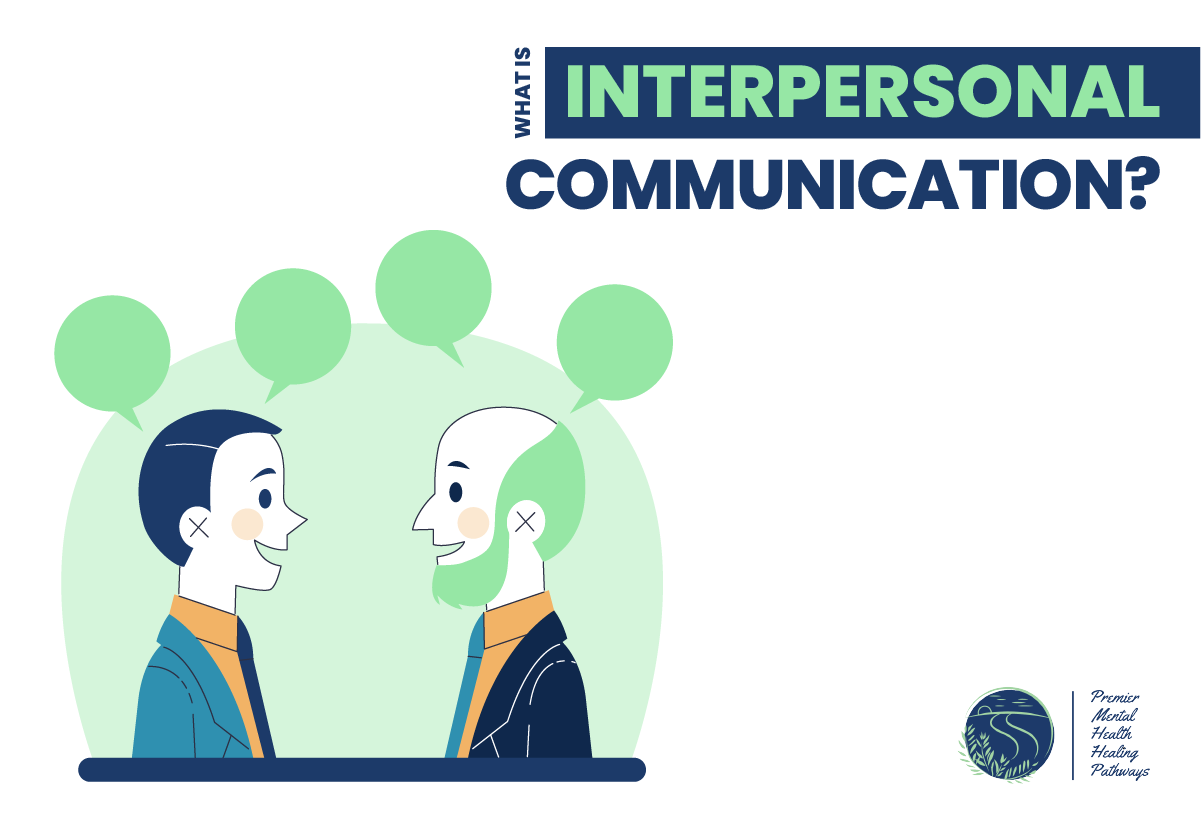The art of talking to other people is still very important, even though technology is making the world more connected. It is the basis of our relationships and affects how we talk to, understand, and connect with other people.
Are you having trouble communicating with others? Premier Mental Health Healing Pathways provides therapy for dealing with interpersonal issues.
Let us look at what interpersonal communication is all about and how it affects our daily lives.
What Is Interpersonal Communication?
The process of people sharing information, feelings, and meaning through spoken and unspoken messages is called interpersonal communication.
It includes both what is said and how it is said. It is usually done face-to-face with two or more people and depends on body language, gestures, tone of voice, and facial expressions.
Learning how to talk to coworkers, clients, friends, and family in a variety of settings in a way that makes sense can change your life and career.
Key Elements of Interpersonal Communication
- Verbal Communication
Verbal communication is when you use spoken or written words to share information, feelings, and thoughts. It includes talking, writing, telling stories, and having conversations.
- Nonverbal Communication
Other than words, people use body language, eye contact, facial expressions, and other subtle cues to communicate. These cues often work better than words. It is a very important part of communicating feelings, attitudes, and intentions.
- Active Listening
Active listening means paying full attention to what is being said, making sure you understand what is being said, and responding with care. It involves empathy, attention, and genuine interest in understanding the speaker’s perspective.
- Feedback
Giving a response to a message from someone else is what feedback is. It helps people understand better, validate their feelings, and make sure they can communicate clearly by confirming or changing how the message was understood.
- Empathy
Empathy means being able to understand and share someone else’s feelings. It means putting yourself in someone else’s shoes, recognizing how they feel, and responding with kindness and understanding.
Difference Between Interpersonal Communication and Intrapersonal Communication
Interpersonal communication is when two or more people talk to each other and share information. It includes relationship focus, interaction, verbal and nonverbal elements, feedback loops, and social context. Examples include conversations with friends, family, and colleagues.
Intrapersonal communication includes a person’s inner dialogue, thoughts, and reflections. It helps with self-reflection, problem-solving, controlling emotions, setting goals, and expressing oneself. Examples include silent contemplation, self-reflection, and goal-setting.
Why Interpersonal Communication is Important?
- Building Relationships
Talking to each other is the key to all relationships, personal and business.
Being able to talk to each other well is important for making strong, meaningful bonds because it builds trust, understanding, and an emotional connection.
- Problem-Solving
It is important to talk things out in an open and honest way in order to solve problems and clear up confusion.
To handle disagreements in a healthy way and make relationships stronger, people should say what they think, listen carefully, and try to find things they agree on.
- Improving Collaboration
Talking to other people at work makes teamwork, collaboration, and new ideas more likely.
By working together, sharing ideas, and getting feedback, teams can reach their goals and help the company do well.
- Personal Growth
Talking to other people helps you be more open and honest, as well as learn more about who you are.
By having deep conversations, thinking about their experiences, and asking others for feedback, people can improve the way they talk to others and learn more about themselves and others.
Making Meaningful Connections
Talking to other people improves our lives by letting us make connections, get closer, and enjoy our social activities more.
When we share our joy, grief, hopes, and dreams, it makes us feel like we belong and are the same as everyone else.
Impersonal Communication Examples
In order to help you understand interpersonal communication even better let’s look:
- Contacts by Phone: Since you can only hear voices on the phone, you need to be able to talk to people clearly
- Presentations: When you give information, you use all four types of interpersonal communication. You should speak clearly, read body language, pay attention to what people are saying, and use written materials
- Email:If you want to send emails at work, you need to be able to write clearly
- Texting: Texting is a form of written communication that is less formal than emails or letters and needs a more personal touch
In conclusion, what is interpersonal communication?
Interpersonal communication is what makes relationships work and shapes how we deal with other people in many areas of our lives.
Part of it is active listening, feedback, empathy, and knowing what is being said and what is not being said.
You need to be able to talk to other people clearly in order to make friends, solve problems, work together, and grow as a person.
Knowing how important it is to communicate and working on our communication skills can help us connect with others more deeply and get along better with them.
FAQs
What is the concept of interpersonal?
When something happens between or involves more than one person, it is called interpersonal. The ability to get along with other people is called an interpersonal skill. The word “interpersonal” only means one thing, so when you hear it, you know that someone is talking about how people interact with each other.
What are the psychological functions of interpersonal communication?
Communicating with other people is mostly used to listen, talk, and settle arguments. Every time and every place, people talk to each other in different ways, both with words and body language.
What are the four types of interpersonal communication?
- Making phone calls
- Meetings
- Presentations
- Emails and Texting






No comment